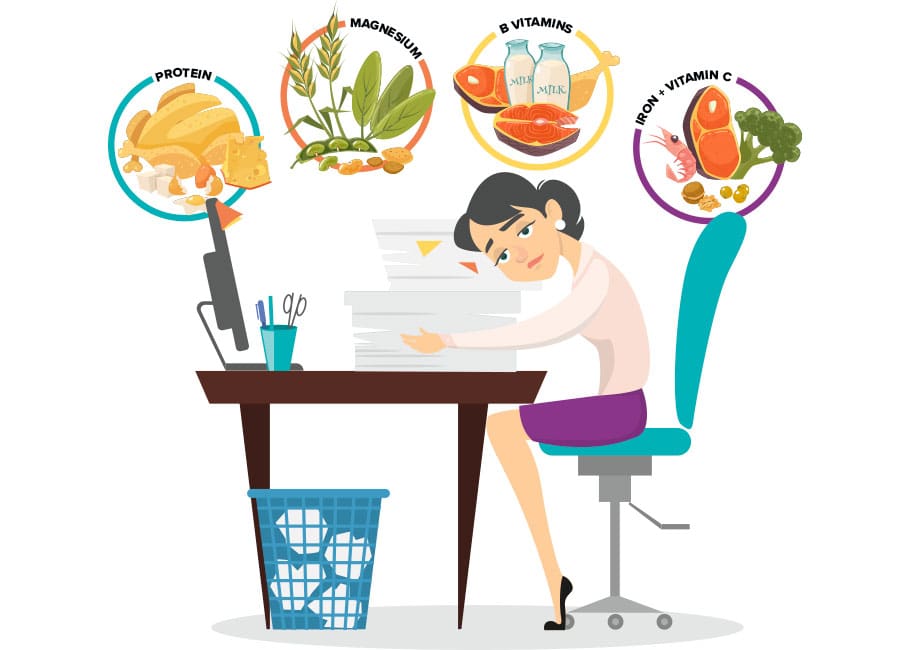
© Artinspiring / stock.adobe.com
Fight fatigue
Changing what you put inside your body may help boost the energy you are able to put out
Feeling sluggish? According to studies, 42% of Americans start feeling tired as early as noon. Medical conditions, stress, physical exertion and lifestyle factors may cause persistent exhaustion.
Turning to processed foods and energy drinks may provide a temporary burst of energy, but a crash often follows. Instead, a well-balanced diet can provide steady energy throughout the day.
Protein
According to the American Journal of Clinical Nutrition, a daily breakfast, especially one rich in protein, provides sustained energy throughout the day.
Good protein sources include poultry, nuts, eggs, cheese and tofu. Andrea D’Ambrosio, a registered dietitian in Ontario, suggests eating protein-rich foods such as lean meat, fish, eggs, beans, legumes, and dairy or dairy alternatives.
Magnesium
Low magnesium levels can deplete energy levels. Magnesium can improve your sleep quality and help you feel more rested and energized.
Leafy green vegetables, beans, nuts, legumes and whole grains are high in magnesium. Since most people get enough magnesium naturally from foods, Virginia-based registered dietitian Kristin Gillespie suggests that individuals with conditions such as diabetes, irritable bowel syndrome or celiac disease consider discussing supplementation with their doctor.
Complex carbohydrates
Carbohydrates are one of the body’s primary sources of energy. A mix of complex carbs, protein and healthy fats provides long-lasting energy. Consuming complex carbs with other macronutrients may relieve symptoms or headaches caused by spiked blood sugar from simple carbohydrates, says Maryland-based registered dietitian, nutritionist and Costco member Sarah Schlichter.
Whole-grain items, like whole-wheat bread, whole-grain cereal and brown rice, are excellent sources of complex carbs. Avoid processed carbs such as white bread, white rice, snacks, sweets, added sugars and pastries, which quickly deplete energy.
B vitamins
Vitamin B12 is crucial for making red blood cells, which deliver oxygen to all parts of your body. A B12 deficiency can cause fatigue and weakness, says Boston-based Dr. William W. Li, physician, scientist and author.
Meat, poultry, fish and dairy products are good sources of vitamin B12. Most healthy adults get adequate B12 from their regular diet. However, vegetarians, vegans and older adults are at increased risk of vitamin B12 deficiency and may want to consider a B12 supplement.
Iron
Iron is an essential element in blood production. We need it to produce hemoglobin, the substance in red blood cells that enables them to carry oxygen. Low levels of iron could result in brain fog, dizziness and weakness.
Seafood, enriched grains, spinach, kidney beans, chickpeas, tofu, lentils and meat are excellent sources of iron. Pair iron-rich foods with vitamin C (think citrus, broccoli or bell peppers) to enhance iron absorption, says New York–based registered dietitian nutritionist and Costco member Katrina Trisko—for example, lentils and red bell peppers, healthy greens and lemon juice, or oatmeal with blueberries.
CoQ10
Coenzyme Q10 (CoQ10) is an antioxidant that assists in generating energy in the cells. The body produces CoQ10, which is abundant in the heart, kidneys, liver and pancreas. Because CoQ10 levels fall with aging, taking CoQ10 supplements may help fight atherosclerosis, heart failure, angina, diabetes and Parkinson’s disease, says Li.
Dietary sources of CoQ10 include organ meats, oily fish and whole grains.
Potassium
Potassium is one of the critical macro minerals (minerals required in relatively large quantities by the body) responsible for various functions, including energy production. Low potassium can cause muscle cramps, spasms and low energy levels, says Trisko.
Significant sources of potassium include potatoes, bananas, lentils, beans, milk, yogurt, tomatoes and spinach.
Good nutrition, hydration, sleep and exercise are beneficial approaches for sustained energy. See a doctor if your fatigue persists for two or more weeks and discuss it with them before taking a supplement.
Post-lunch slump
The post-lunch slump is a common experience. According to the National Sleep Foundation, the circadian rhythm drops significantly between 2 and 5 p.m., resulting in a period of decreased alertness called the post-lunch dip effect. Digesting a heavy lunch can worsen the effect. A brief nap, a brisk walk outside or eating a low-carb breakfast or lunch can help you fight the afternoon crash.—SN

© macrovector / stock.adobe.com
Can coffee make you tired?
As a stimulant, caffeine boosts energy levels, but it can also make you feel tired. Caffeine blocks adenosine receptors from receiving adenosine (the chemical that regulates the sleep-wake cycle, particularly the initiation of sleep). However, it doesn’t affect the production of adenosine molecules. When the caffeine wears off, the buildup of adenosine makes you tired. Furthermore, adding too much sugar to coffee spikes blood glucose levels, with crashes shortly after that, causing a drop in energy. Consume no more than 400 milligrams of caffeine (four or five cups of coffee) per day, and stay hydrated to avoid a caffeine crash.—SN
Costco Connection: Costco carries a wide variety of healthful foods, as well as vitamins, supplements and more, in Costco warehouses and at Costco.com.
Suja Natarajan is a writer based in Virginia.



